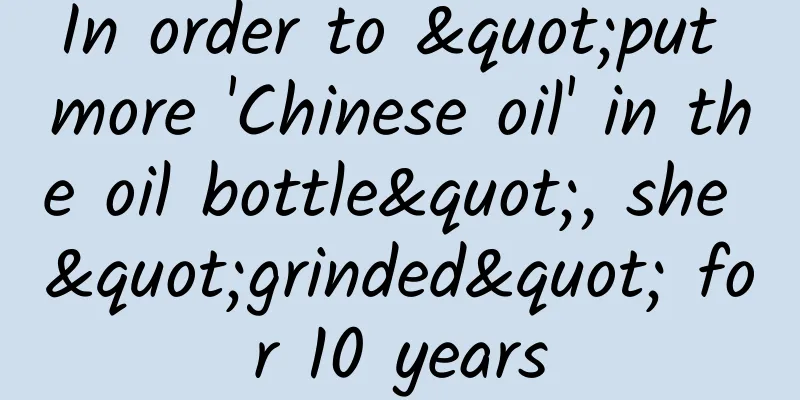In order to "put more 'Chinese oil' in the oil bottle", she "grinded" for 10 years

|
Source: Xinhua Daily Telegraph report, March 7 Author: Xinhua Daily Telegraph reporter Li Song "Every rape flower they plant is a medal for me!" Huang Taocui said with a smile. In the main rapeseed producing areas of China, such as the Sichuan Basin, Jianghan Plain, and Ganpo Land, farmers harvest plump and round rapeseed around May every year, experiencing the joy of a good harvest. Many of these rapeseeds are innovative varieties developed by Huang Taocui. Huang Taocui is a researcher at the Chongqing Academy of Agricultural Sciences and the chief expert of the Chongqing rapeseed industry system. She often said that breeding research should focus on the needs of the country and the expectations of farmers. Only by understanding market demand and listening to farmers' ideas can breeding be more efficient and have a clearer direction. On March 21, 2022, Huang Taocui, a researcher at the Chongqing Academy of Agricultural Sciences, observed the growth of rapeseed varieties at the "Qingyou No. 3" seed production base. Photo by Xinhua News Agency reporter Tang Yi “Choose good seeds when planting, one ridge is worth two.” High-quality rapeseed seeds allow farmers to harvest more rapeseed oil, bringing them “real money” and also bringing fragrance and stability to people’s oil bottles. The Qingyou series of high-quality varieties, such as Qingyou No. 3 and Qingyou No. 8, developed by the research team led by Huang Taocui, have broken through the bottleneck of the traditional rapeseed "three catties of rapeseed to produce one catty of oil" and achieved the target of "two catties of rapeseed to produce one catty of oil", with an oil content of about 50%. The cumulative promotion area of Qingyou series varieties in the main rapeseed producing areas in the Yangtze River Basin has reached more than 30 million mu, with an annual promotion area of more than 6 million mu. "The leading varieties of rapeseed must be in our own hands!" Huang Taocui, who has been engaged in scientific research for more than ten years, is still in her prime. She said that she will continue to work hard to breed more "Chinese rapeseed" with excellent quality so that the oil bottles can be filled with as much "Chinese oil" as possible. "If you don't do it in a hypocritical way, you won't be able to breed good rapeseed varieties" In 2009, Huang Taocui graduated with a master's degree in crop genetics and breeding from Southwest University. When she entered the Chongqing Academy of Agricultural Sciences, she was a little confused. The Academy recruited her to do rapeseed breeding, but what kind of seeds should she breed? When the hospital leader talked to her, he said, "We will do whatever the farmers need." What kind of rapeseed seeds do farmers need? With this question in mind, Huang Taocui and seed promotion and management personnel from a seed company affiliated to the Chongqing Academy of Agricultural Sciences went to the fields and explored the market. Whenever she met a grower, she asked him, "What do you care most about when growing rapeseed?" "Of course, the first is high yield, and the second is high oil content!" The farmer's simple answer requires complex calculations. Rapeseed yield and oil content are both quantitative traits of crops. In the past, many breeding experts in the industry believed that "it is difficult to achieve high oil content with high yield, and high oil content is difficult to achieve high yield", and it is difficult to unify the two indicators. "We must dare to break through the inherent thinking and cultivate different rapeseed that is both high-yielding and high in oil!" The fledgling Huang Taocui is stubborn and sets herself seemingly demanding goals. For a small rapeseed seed, the breeding method is to pollinate and crossbreed varieties that are genetically different but have complementary excellent traits, and select the new varieties needed through the survival of the fittest. In the industry, everyone understands the principles of breeding, but the key is to see who can endure the loneliness, work hard, and work hard. This was a difficult breeding start: the rapeseed test field was more than 10 mu, and Huang Taocui was the only researcher on the project. Huang Taocui worked intensively on the basis of "1 person + more than 10 mu of land". The small test field was carefully divided into more than 1,000 units, and each unit was inserted with its own "ID card". Huang Taocui was like a caring nanny, carefully taking care of the 50 seedlings in each unit, from seedling raising, sowing, planting to harvesting, whether the rapeseed was sick? How much fertilizer was needed? Are the germination periods consistent? All of these had to be recorded one by one. In addition to hiring a few workers during the busy farming season, most of the work had to be done by herself. The complexity of scientific research in agriculture is beyond the imagination of many people. The most tiring part is the artificial pollination of rapeseed. "Farmers grow rapeseed and rely on hardworking bees for pollination," said Huang Taocui, but they have to rely on their own physical strength to remove the male stamens when the rapeseed buds have not yet opened. "Before the rapeseed buds open, use tweezers to carefully separate the petals, pinch off the stamens to remove the male stamens, and then apply pollen from other plants for hybridization." Two to three thousand combinations need to be made for each breeding, and each combination contains different numbers of flower buds. The manual powdering process requires the same action to be repeated tens of thousands of times , while the workers have to bend over in the field, and a whole day can pass by. "If you don't do it, you won't be able to breed good rapeseed varieties." In order to gain time for research, Huang Taocui took breeding materials and went into the mountains of Weining County, Guizhou. At the breeding test site, there was really no place to live, so she rented a local farmer's adobe house. The farmer's beams were full of corn, and every night, mice scurried around. When she woke up the next day, she saw that the quilt was full of fine corn residues... In Luquan County, Yunnan, after the seeds were sown at the test site, a drought happened and the seeds did not germinate. The farmers' own canals were also competing for water. Huang Taocui stood by and refused to persuade them about the water distribution. Tears welled up in her eyes. Finally, after much persuasion, she was able to get some water and save the rapeseed field... She repeated these tasks day after day, year after year. “It took 10 years to produce ‘two bowls of rapeseed and one bowl of oil’” The breeding process is boring and even painful. "The materials selected in the laboratory were originally thought to be good, but when they are planted in the field, they may behave strangely. Some are prone to diseases, some are prone to lodging, and some actually have low oil content..." Huang Taocui said that collecting, identifying, evaluating and creating good breeding materials is often like "looking for a needle in a haystack" and can only be done through repeated trials. Huang Taocui, a researcher at the Chongqing Academy of Agricultural Sciences, conducts experiments in the molecular marker room. Photo by Xinhua News Agency reporter Tang Yi In 2013, Huang Taocui's Qingyou No. 3 cultivation entered a critical period. No matter how far the journey was or how bumpy the mountain road was, she traveled to rapeseed producing areas in more than 10 provinces and cities across the country and always insisted on working in the fields. In November of that year, Huang Taocui, who was two months pregnant, went to Tongren, Guizhou to observe the seedlings. At that time, she did not have her own technical team, and she went to each demonstration site by herself. She still remembers that her pregnancy reaction was very serious at that time, but the test data could not wait. Once, she could only board the green train that departed at 10 o'clock in the evening, holding a standing ticket. "As soon as we stepped onto the crowded train, all kinds of unpleasant smells made it hard to breathe. Before long, my stomach started to churn, and waves of nausea made me break out in sweats. Every minute was torture." Huang Taocui managed to hold on for 9 hours in the dark. At noon the next day, she finally arrived at the experimental field. She used a tape measure to measure the root and stem of each plant, the height of the seedling, and carefully counted the number of leaves on each plant. "The growth data are all normal, so I feel at ease. Although both legs are swollen, this trip is worth it." The day before the cesarean section, she was still busy with work in the base's experimental field. On the third day after the birth of her child, Huang Taocui was discharged from the hospital and returned home. She received a notice to write a national variety approval application for Qingyou No. 3. If she didn't make it in time, she would have to wait another year. "No one else can do this for me, I have to do it myself." Enduring the pain from the postpartum wound, Huang Taocui went to work. "While working, my eyes started to hurt, and soon I couldn't see the words on the computer screen clearly." Huang Taocui had to lie on a folding chair for a while and then get up to write, repeating this over and over again. Her husband, who was waiting beside her, was so distressed that he tried to stop her from doing it. Huang Taocui refused, saying, "Qingyou 3 is also my 'child'. I have been working on it for several years and it is about to be born. I cannot let it have a 'difficult birth'." Rapeseed breeding cannot be interrupted. When the child was just 40 days old, Huang Taocui took him to live in a simple temporary scientific research residence beside the field. There was no door in the room, so she hung a bed sheet to make a simple partition; during the break from work, she found an open space beside the field to feed the baby. The child grew up day by day beside the rapeseed field, and the new varieties cultivated by Huang Taocui continued to mature under her careful care... After 10 years of continuous research and development, Qingyou No. 3, developed by Huang Taocui, has passed the process of variety application, breeding inspection, expert evaluation and ranking, and national approval, with an oil content of 49.96%, achieving the progress from "three bowls of rapeseed and one bowl of oil" to "two bowls of rapeseed and one bowl of oil". Qingyou No. 8, which was bred later, has an oil content of 51.54%! “Breeders can’t just say ‘good enough is good enough’” Huang Taocui once bred a "failed variety" - Qingyou No. 5. The breeding started smoothly in 2013. When Qingyou No. 5 was planted in Chongqing, Sichuan and other places for trial, the yield per mu was more than 20% higher than that of ordinary rapeseed varieties. The high-yield trait it showed was surprising. This highly anticipated new variety "fell" during a trial planting in Luoping, Yunnan Province. A strong wind blew down almost all the Qingyou No. 5 varieties in the test field. After careful review, it was found that although Qingyou No. 5 has dense fruits and high yield, the rapeseed plants are long, the root system is slightly shallow, and the lodging resistance is slightly weak, especially in strong winds and loose soil environments, the problem is more obvious. At that time, Qingyou No. 5 was in the review process. Some people believed that the main traits of this new variety were excellent and its merits outweighed its flaws, so it could be promoted further. However, Huang Taocui withdrew the information without hesitation. "During the breeding process, we discovered some hidden shortcomings of the varieties in advance, and we should feel lucky," said Huang Taocui. "The last thing breeders should do is say 'it's good enough' and never push varieties with unstable traits to the market." Setbacks are never in vain. Huang Taocui later used Qingyou No. 5 as a basis to find lodging-resistant varieties through genetic testing and improved varieties. Later, Jingyou No. 1 was launched on the market, becoming a "new star" of rapeseed with its high yield, high oil content and lodging resistance. In 2014, Qingyou No. 1 was officially launched on the market. It is high-yielding and suitable for light cultivation. In 2015, Qingyou No. 2 was launched. It is early maturing and suitable for rice-oil rotation. In 2016, Qingyou No. 3 had an oil content of 49.96%. In 2020, Jingyou No. 1 had a high oil content, was resistant to lodging, and tolerated dense planting. In 2021, Qingkang No. 1 was launched. It is resistant to clubroot disease... One innovative variety after another has been recognized by farmers and accepted by the market. In Huang Taocui's eyes, in order to push open the doors to the magical world of rapeseed breeding and dig out "treasures" one by one, scientific research must never be done behind closed doors . "Only by humbly asking for advice and learning from others' strengths can the pace of innovation be faster and more stable." In 2009, Huang Taocui learned that the director of the Mian County Seed Station in Hanzhong City, Shaanxi Province, had a unique skill in chemical emasculation of hybrid rapeseed. "If you master this skill, you can save many steps of manual emasculation and greatly improve breeding efficiency." In order to learn the skill, Huang Taocui went to the station three times to ask for advice. Every time she saw the station director busy in the field, Huang Taocui would quietly stand by his side without saying much, waiting for him to have some free time to ask her questions. While others were teaching, Huang Taocui also tried it herself. She carried a sprayer and went to the field to test the concentration of the spray for rapeseed fields, and wrote down the test data. "During the learning and communication, I encountered problems that others had encountered before. We all had a sense of resonance in scientific research. He taught me, and I felt a sense of accomplishment." Over the years, the Huang Taocui technical team has also cooperated with relevant expert teams from the Oil Crops Research Institute of the Chinese Academy of Agricultural Sciences, Huazhong Agricultural University, etc., using cutting-edge technologies related to molecular marker-assisted breeding to continuously tackle key issues such as cultivating dwarf plants with strong resistance to pod cracking and improving the mechanization of rapeseed harvesting, and achieved innovative results. “Focus on scientific research to meet the needs of the country and the expectations of the people” In 2006, Huang Taocui was a biology teacher at a middle school in Hubei Province and had been teaching for five years. One day, she saw a report titled “A Seed Will Rewrite the History of Rapeseed in the World”, which told the story of how Professor Li Jiana, a rapeseed breeding expert at Southwest Agricultural University (now Southwest University), combined yellow seeds, high yield, high oil content, and double-low traits to create a yellow-seeded rapeseed breeding technology system. Huang Taocui was shocked when she read the report. Growing up in the countryside, she instinctively thought that rapeseed was black. "I didn't expect that through breeding, the color of rapeseed could be changed. This is more magical than a magician!" This is the rapeseed variety "Qingyou No. 3". Photo by Xinhua News Agency reporter Tang Yi In this way, Huang Taocui applied to be Professor Li Jiana's student, and the magical world of rapeseed breeding was opened to her. For more than ten years, Huang Taocui has always maintained her curiosity and enterprising spirit in rapeseed breeding, and has also gained a sense of accomplishment. When she went to the countryside to do research, Huang Taocui could accurately identify her "child" at a glance as the car shuttled between the flat plains and the ridges of the fields. The sun shone on the endless rapeseed fields, which looked like a golden ocean from afar. In the Qingyou No. 3 rapeseed field, an old farmer in his 60s turned around and left when he heard that Huang Taocui was a breeder. Just as she was wondering, the old farmer ran back panting with a large bouquet of flowers. He said that he had been growing rapeseed all his life, but had never grown a variety like Qingyou No. 3 that produced so much oil, which allowed him to make a lot more money. "I feel so happy when I see farmers choose my products and recognize my products," said Huang Taocui. Looking back at history, in order to firmly grasp the Chinese people's own oil bottle, generations of rapeseed breeders have been working hard and bravely climbing the peak of science and technology: in the 1970s and 1980s, the average per mu yield of rapeseed in my country was only more than 100 kilograms. Rapeseed breeders represented by Fu Tingdong, an academician of the Chinese Academy of Engineering and professor of Huazhong Agricultural University, have greatly increased the per mu yield of rapeseed by innovating and tackling the research and development path of three-line hybrid rapeseed. Around 2000, rapeseed breeders focused on complex problems and cultivated double-low rapeseed, which greatly improved the health quality of rapeseed oil... In recent years, the annual rapeseed planting area in China has remained stable at more than 100 million mu. In the Chinese people's oil bottle, rapeseed oil is a very important "guiding star". The Central Government's No. 1 document in 2023 proposed to coordinate comprehensive support measures for rapeseed, promote rice-oil rotation, and vigorously develop and utilize winter fallow fields to plant rapeseed. Huang Taocui said that the Central Government's No. 1 document is also a "baton" for seed industry science and technology workers to tackle key problems. It is both a pressure and a motivation. Focusing scientific research on the needs of the country and the expectations of the people, the research and development of "different rapeseed" has a new direction. In my country's main winter rapeseed production areas, rapeseed is generally harvested in early May, but it is a bit late to sow rice in some places at this time, which affects the space for rice-rape rotation. "We are trying to cultivate early-maturing varieties to advance the rapeseed harvest period by about 15 days to mid-April, so as to stagger the rice sowing season and free up more rapeseed planting fields," said Huang Taocui. "If this technology is broken through, Chongqing alone will have more than 1 million mu of winter idle land suitable for rapeseed rotation every year. What a huge potential for increasing production!" At the beginning of this year, Huang Taocui's technical team successfully selected more than 40 early-maturing materials with a growth period of about 180 days from the Chongqing rapeseed material library. This also means that Huang Taocui and his team have entered a new stage of breeding in the research of new rapeseed varieties with early maturity, high oil content, and suitable for mechanical harvesting... Cultivating high-quality "Chinese rapeseed" Let’s put more “Chinese oil” in oil bottles Huang Taocui, come on! |
<<: What, carbon dioxide can be used to make batteries?
>>: First, first, first, they are the first in these fields!
Recommend
Nurse! Come quickly! There are bubbles entering the infusion!
Audit expert: Qu Bo Chief Physician of General Su...
[Inspirational story] Don’t be afraid of falling and never give up
[Inspirational Story] Don't be afraid of falli...
Do your fingers turn white and purple in cold weather? Don't ignore it, it may be "Raynaud's phenomenon"
Many people have experienced their fingers being ...
In the third quarter, the Chinese mobile phone market changed from "one superpower and many strong players" to "many strong players competing for supremacy".
[[433226]] Data from research institutions show t...
Google: We're not making tablets anymore
A year ago, the "Tablet" section on Goo...
Morgan Stanley: NVIDIA will account for 51% of AI chip wafers produced worldwide in 2024
Whether it is GPU gaming/professional graphics ca...
Detailed illustration of the review process for Google Analytics and Google Ads!
Google Ads is an important platform for online me...
In summer, you should control your blood lipids! Be careful of "blood lipid assassins", and eat less of these delicacies...
Summer is a restless season July and August are e...
Ten marketing trends for 2022
At the end of 2019, there was a very popular joke...
"China's Sky Eye", new news →
July 26, 2023 (Beijing time) National Key R&D...
Pixel has a problem again. This time it shuts down automatically when the battery is still 30%
Google's own son has been plagued by problems...
How to make a submersible make sound from the deep sea?
The deep sea has always been beautiful and myster...
How to make your SMS/Push more efficient?
Operations serve as a bridge between users and pr...
A high fever of 42℃ almost killed him, just because he ate leftovers?
Recently, a woman in Guangzhou had a high fever a...
What is the difference between Bytedance/Feed/DOU+? How to choose information flow promotion?
DOU+, Feed and Qianchuan all belong to "paid...









